 |
|---|
Leadership |
|
Administrative divisions |
Government official in Prussia
This is a list of trade ministers of Prussia.
 |
|---|
This is a list of trade ministers of Prussia.
The trade ministers headed the Department of Factories, Commerce and Manufactories, [1] and from 1848 the Ministry of Trade, Commerce and Public Works, later the Ministry of Trade and Commerce of Prussia. [2]
| Name | Image | Term Start | Term End | Notes |
|---|---|---|---|---|
| Johann Andreas Kraut |  | 1713 | 1723 | |
| Samuel von Marschall | 1740 | |||
| Erasmus Robert von Patow |  | 1848 | 1848 | Interim |
| Karl August Milde | 1848 | 1848 | ||
| August von der Heydt |  | 1848 | 1862 | |
| Heinrich Wilhelm von Holtzbrinck | 1862 | 1862 | ||
| Heinrich Friedrich August von Itzenplitz | 1862 | 1873 | Interim from October 8, 1862 [3] | |
| Heinrich Karl Julius von Achenbach | 1873 | 1878 | ||
| Albert von Maybach | 1878 | 1879 | ||
| Karl von Hofmann | 1879 | 1880 | Interim from March 14, 1879 | |
| Otto von Bismarck |  | 1880 | 1890 | While serving as Prime Minister and Reich Chancellor [4] |
| Hans Hermann von Berlepsch | 1890 | 1896 | ||
| Ludwig Brefeld | 1896 | 1901 | ||
| Theodor Adolf von Möller |  | 1901 | 1905 | |
| Clemens von Delbrück | 1905 | 1909 | ||
| Reinhold von Sydow | 1909 | 1918 | ||
| Otto Fischbeck | 1918 | 1921 | ||
| Wilhelm Siering | 1921 | 1925 | ||
| Walther Carl Rudolf Schreiber |  | 1925 | 1932 | |
| Friedrich Ernst | 1932 | 1933 | ||
| Alfred Hugenberg | 1933 | 1933 | ||
| Kurt Schmitt | 1933 | 1935 | ||
| Hjalmar Schacht |  | 1935 | 1937 | |
| Hermann Göring |  | 1937 | 1938 | |
| Walther Funk |  | 1938 | 1938 | |
| Franz Seldte | 1935 | 1938 | Labor Minister |
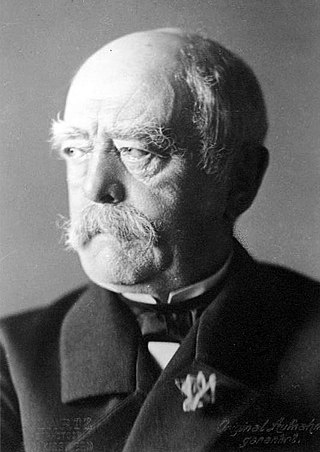
Otto, Prince of Bismarck, Count of Bismarck-Schönhausen, Duke of Lauenburg was a Prussian and later German statesman and diplomat.

The foreign relations share the Bangladeshi government's policies in its external relations with the international community. The country pursues a moderate foreign policy that places heavy reliance on multinational diplomacy, especially at the United Nations and World Trade Organization (WTO). Since independence in 1971, the country has stressed its principle of "Friendship towards all, malice towards none" in dictating its diplomacy. As a member of the Non-Aligned Movement, Bangladesh has tended to not take sides with major powers. Since the end of the Cold War, the country has pursued better relations with regional neighbours.

Frederick William IV, the eldest son and successor of Frederick William III of Prussia, was king of Prussia from 7 June 1840 until his death on 2 January 1861. Also referred to as the "romanticist on the throne", he was deeply religious and believed that he ruled by divine right. He feared revolutions, and his ideal state was one governed by the Christian estates of the realm rather than a constitutional monarchy.
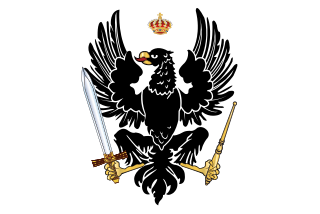
Prussia was a German state located on most of the North European Plain, also occupying southern and eastern regions. It formed the German Empire when it united the German states in 1871. It was de facto dissolved by an emergency decree transferring powers of the Prussian government to German Chancellor Franz von Papen in 1932 and de jure by an Allied decree in 1947. For centuries, the House of Hohenzollern ruled Prussia, expanding its size with the Prussian Army. Prussia, with its capital at Königsberg and then, when it became the Kingdom of Prussia in 1701, Berlin, decisively shaped the history of Germany.

The Ministry of Commerce (MOFCOM) is a executive department of the State Council of the People's Republic of China that is responsible for formulating policy on foreign trade, export and import regulations, foreign direct investments, consumer protection, market competition and negotiating bilateral and multilateral trade agreements. it is the 20th-ranking department of the State Council. The current minister is Wang Wentao.
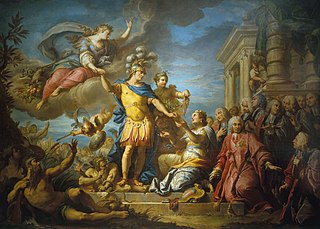
The 1748 Treaty of Aix-la-Chapelle, sometimes called the Treaty of Aachen, ended the War of the Austrian Succession, following a congress assembled on 24 April 1748 at the Free Imperial City of Aachen.
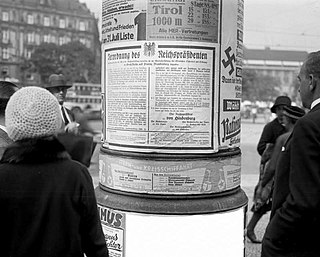
The 1932 Prussian coup d'état or Preußenschlag took place on 20 July 1932, when Reich President Paul von Hindenburg, at the request of Franz von Papen, then Reich Chancellor of Germany, replaced the legal government of the Free State of Prussia with von Papen as Reich Commissioner. A second decree the same day transferred executive power in Prussia to the Reich Minister of the Armed Forces Kurt von Schleicher and restricted fundamental rights.
A Commerce minister is a position in many governments that is responsible for regulating external trade and promoting economic growth. In many countries, this role is separate from a finance minister, who has more budgetary responsibilities.

The Free State of Prussia was one of the constituent states of Germany from 1918 to 1947. The successor to the Kingdom of Prussia after the defeat of the German Empire in World War I, it continued to be the dominant state in Germany during the Weimar Republic, as it had been during the empire, even though most of Germany's post-war territorial losses in Europe had come from its lands. It was home to the federal capital Berlin and had 62% of Germany's territory and 61% of its population. Prussia changed from the authoritarian state it had been in the past and became a parliamentary democracy under its 1920 constitution. During the Weimar period it was governed almost entirely by pro-democratic parties and proved more politically stable than the Republic itself. With only brief interruptions, the Social Democratic Party (SPD) provided the Minister President. Its Ministers of the Interior, also from the SPD, pushed republican reform of the administration and police, with the result that Prussia was considered a bulwark of democracy within the Weimar Republic.

The Ministry of Commerce and Industry administers two departments, the Department of Commerce and the Department for Promotion of Industry & Internal Trade. The head of the Ministry is a Minister of Cabinet rank.

Ludwig Friedrich Victor Hans Graf von Bülow was a Westphalian and Prussian statesman.
Heinrich Friedrich Graf von Arnim-Heinrichsdorff-Werbelow was a Prussian statesman.
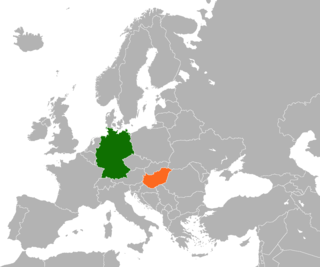
Germany and Hungary are both member states of the European Union, NATO, OECD, OSCE, Council of Europe and the World Trade Organization. Germany has an embassy in Budapest. Hungary has an embassy in Berlin, two general consulates and nine honorary consulates. The Agreement between the Federal Republic of Germany and the Republic of Hungary on 'Friendly Cooperation and Partnership in Europe' concluded on 6 February 1992 is one of the principal cornerstones of today's bilateral relations.

Hardeep Singh Puri is an Indian politician and former Indian diplomat who is currently serving as the Minister of Petroleum and Natural Gas and Minister of Housing and Urban Affairs in the Government of India. He presently also holds the record as the longest serving Minister for Housing and Urban Affairs in history.

Karl Sigmund Franz Freiherr vom Stein zum Altenstein was a Prussian politician and the first Prussian education minister. His most lasting impact was the reform of the Prussian educational system.
The Treaty of Amity and Commerce between the Kingdom of Prussia and the Tokugawa Shogunate (1861) opened diplomatic relations and trade between the two countries. This would come in a series of unequal treaties imposed on the Tokugawa Shogunate in its later stages.

The Prussian State Ministry from 1808 to 1850 was the executive body of ministers, subordinate to the King of Prussia and, from 1850 to 1918, the overall ministry of the State of Prussia consisting of the individual ministers. In other German states, it corresponded to the state government or the senate of a free city.
The State Chancellor of Prussia was the highest minister of the Kingdom of Prussia and existed from 1807 to 1850. The State Chancellor was the forerunner to the Prime Minister of Prussia.

The Ministry of Trade, Commerce and Public Works was a ministry in Prussia that was founded in 1848. Its beginnings date back to 1740. In 1878 it became the Ministry of Trade and Commerce by spinning off the Ministry of Public Works, which was dissolved in 1921; the responsibilities were transferred back to the Ministry of Agriculture, Domains and Forestry and of Trade and Commerce. In 1932 it became the Ministry of Economy and Labor.